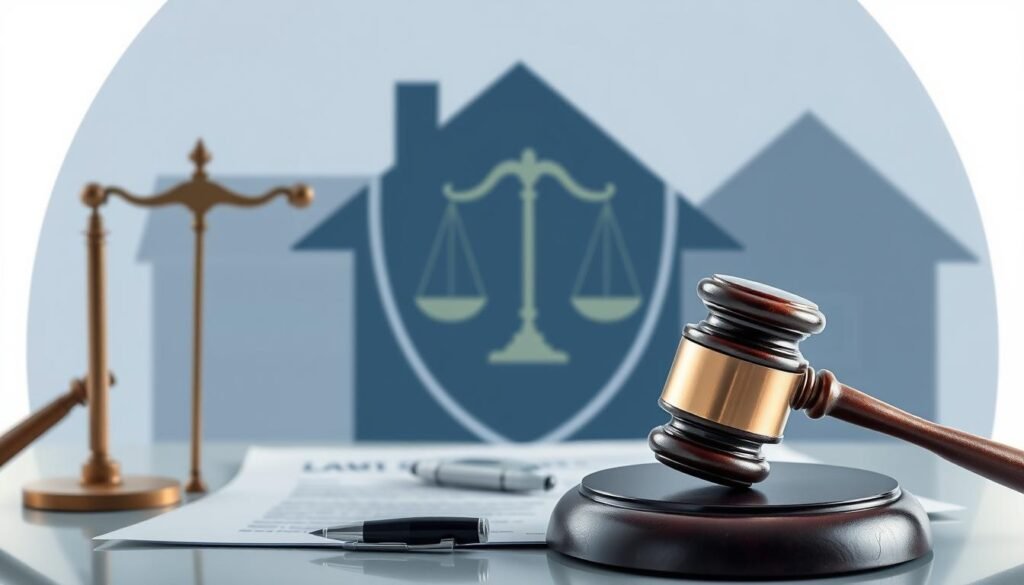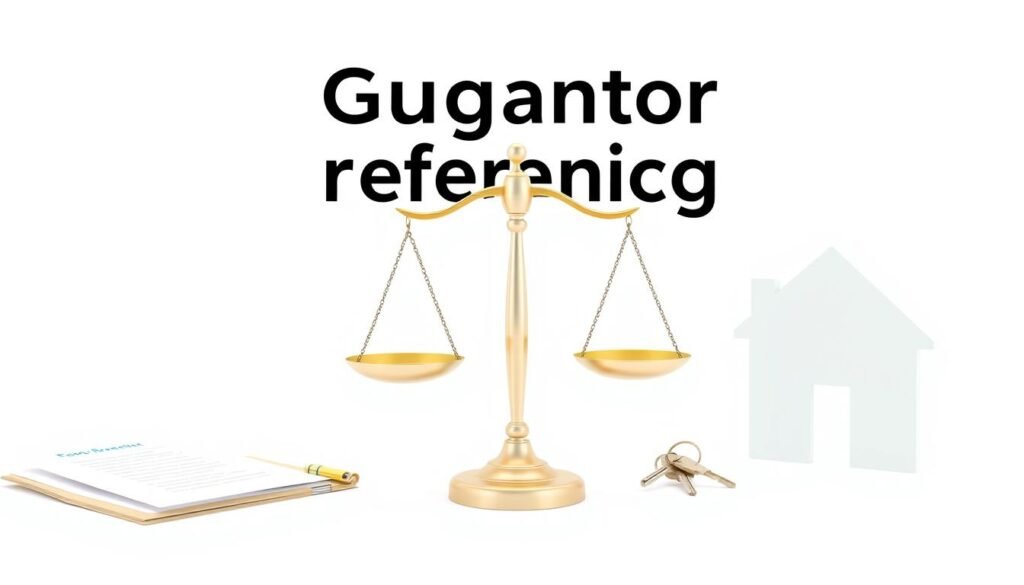As a UK landlord, have you ever faced a guarantor failing to meet their duties? Guarantors are key in protecting landlords from tenant defaults. But what if this safety net fails? This guide will help you understand and deal with these complex issues. It ensures your rental property stays safe.
Key Takeaways
- Understand the legal framework and common requirements for guarantor agreements in UK property rentals.
- Explore the scope of a guarantor’s liability and the duration of guarantor agreements.
- Discover alternative solutions to failed guarantor situations, including professional guarantor services and insurance options.
- Learn the proper legal enforcement and debt recovery procedures to pursue when a guarantor fails to meet their obligations.
- Implement preventive measures to mitigate future guarantor problems and strengthen your rental business.
Understanding Guarantor Arrangements in UK Property Rentals
In the UK, guarantors are key in property rentals. They help when tenants have limited credit, low income, or other financial issues. These agreements give landlords peace of mind, knowing the rent will be paid.
It’s important to know the legal rules and what guarantors must do. This affects both landlords and tenants.
Definition and Purpose of Rental Guarantors
A guarantor is someone who promises to pay for a tenant’s rent and other costs if they can’t. They are often needed for tenants with poor credit, low income, or no fixed address.
In commercial leases, guarantors are common, especially if the tenant is a company. For homes, guarantors are more often asked for if the tenant’s credit score is low.
Legal Framework for Guarantor Agreements
The legal framework for guarantor agreements in the UK is based on contract law. Guarantors must fill out a form, give personal details, and pass credit checks. They then sign an agreement with the landlord.
This agreement explains what the guarantor must do, how long it lasts, and who the tenant and property are. Landlords might check the guarantor’s credit, income, and financial situation. They might also ask if the guarantor owns a home.
Common Guarantor Requirements
Often, guarantors are family members who trust the tenant. For commercial leases, guarantors need to be homeowners with stable jobs or money to cover claims.
In home rentals, parents or relatives of young people or students are often guarantors. They must fill out a form, give personal details, and pass credit checks. They also sign an agreement with the landlord.
| Guarantor Type | Common Requirements |
|---|---|
| Residential Tenancies |
|
| Commercial Leases |
|

Initial Steps When a Guarantor Fails Referencing
When a guarantor fails referencing, landlords in the UK face a tough situation. Some might refuse the application. Others might ask for a bigger security deposit or more advance rent. But, some landlords might look at the bigger picture, not just the guarantor’s report.
Talking openly is key in these times. Tenants should explain their situation clearly. This can help landlords see the whole story and find a way forward.
- Looking for other places with different landlords is a good idea if one application is turned down.
- Landlords might accept more references or explanations for credit problems, depending on the case.
Being flexible and understanding can solve problems when a guarantor fails. By working together and looking at other options, the issues can be overcome.

Legal Responsibilities and Obligations of Guarantors
In the UK, guarantors are key in following landlord-tenant laws. They must pay rent or bills if the tenant can’t. They also cover damages and take on loan defaults.
Guarantors have clear rights and limits in their agreements. These agreements must be written and signed. The ‘privity of contract’ rule means only those who sign have rights or duties.
Scope of Guarantor Liability
Guarantor duties depend on the agreement. They usually pay rent or bills and cover damages. They also take on loan defaults. Guarantors can ask the primary party to pay back if they have to cover costs.
Duration of Guarantor Agreements
Guarantor agreements match the length of the main contract. But, in some cases, they can last longer. This is common in commercial tenancies where the guarantor might have to take over the lease.
Rights and Limitations of Guarantors
- Guarantors must be told if the primary party can’t meet their obligations.
- They can limit their liability to certain amounts or times as agreed.
- They can ask the court to remove their guarantee if they can’t continue.
It’s vital to know the legal duties of guarantors. This is especially true if you need a guarantor for a deal. Getting legal advice before signing is a good idea to protect your interests.
| Guarantor Responsibilities | Guarantor Rights |
|---|---|
| Pay unpaid rent or bills | Recover expenditures from primary party |
| Cover damages not repaired by primary party | Receive notification of primary party default |
| Take financial responsibility in case of loan default | Limit liability to specific amounts or durations |
| Fulfil primary party’s obligations | Request court withdrawal of surety |
Alternative Solutions to Failed Guarantor Situations
When a guarantor can’t meet their promises, landlords look for other ways to protect themselves. Rent guarantee insurance is one option. It helps cover the risk of tenants not paying rent. This is great for landlords who are unsure about tenants with bad credit or unstable jobs.
For business rentals, landlords can ask the potential guarantor to be a joint tenant. This means the guarantor shares the legal duties of the lease. It gives landlords more peace of mind.
- Landlords might ask for bigger security deposits or more rent upfront from tenants with bad references. This helps reduce the risk of not getting paid.
- They might also ask for more references, like from old landlords or employers. This helps understand the tenant’s situation better.
- Landlords might be open to changing the tenancy agreement based on the tenant’s situation. This could include credit issues or other referencing problems.
By looking into these alternative guarantor options, landlords can find new ways to deal with guarantor failures. This helps them find reliable tenants.
| Reason for Tenant Referencing Failure | Percentage of Cases |
|---|---|
| Poor credit history | 40% |
| Insufficient income | 25% |
| Previous rental issues | 15% |
| Unstable employment | 10% |
| Criminal record | 5% |
Guarantor Problems: What to Do When a Guarantor Fails: UK Landlord Guide
Immediate Actions for Landlords
When a guarantor fails, landlords must quickly check the tenancy and guarantor agreements. It’s key to know the legal rules and what the guarantor agreed to do. They need to act fast to handle the problem and avoid bigger issues.
Documentation and Communication Requirements
Keeping detailed records of all talks and problems is vital. Landlords should keep track of messages to the guarantor, any replies, and the tenant’s payment and property condition. Talking clearly with the tenant and the failed guarantor helps understand the situation and find ways to fix it.
Risk Assessment Strategies
Landlords must evaluate the risk of the guarantor not paying. They should look at the tenant’s payment history, the property’s state, and the possible financial and legal problems. Based on this, they can look for new guarantors, ask for more deposit, or think about rent insurance.
| Guarantor Requirement | Typical Criteria |
|---|---|
| Age | 18 or older |
| UK Residency | Required |
| Income | 3 times the annual rent |
| Credit Score | Good credit history |
By taking these steps, landlords can deal with guarantor problems. They can find good ways to protect their property and money.
Professional Guarantor Services and Insurance Options
When a tenant’s guarantor doesn’t meet their obligations, landlords in the UK face tough times. Luckily, there are other ways to protect against tenant default and unpaid rent. Professional guarantor services and rent guarantee insurance are two such options.
Rent guarantee insurance covers a set period of rental payments if a tenant doesn’t pay. It acts as a safety net, keeping rental income steady even when tenants don’t pay on time. Landlords should look closely at the terms, costs, and what’s covered to find the right policy for their properties.
Professional guarantor services offer a strong financial backing, unlike individual guarantors. They provide landlords with extra security. With a professional guarantor, landlords can rest easy knowing they have a reliable backup if a tenant doesn’t pay rent.
Landlords should compare these alternatives with traditional guarantor setups. By looking at the features, benefits, and costs, they can make smart choices. This helps protect their investments and reduces the risks of tenant default.
The choice between professional guarantor services, rent guarantee insurance, or traditional guarantors depends on the landlord’s needs and the tenant’s financial situation. By staying informed and proactive, landlords can overcome these challenges. This ensures the long-term success of their rental properties.
Legal Enforcement and Debt Recovery Procedures
When a guarantor fails to meet their obligations, landlords may need to pursue legal action. This can involve making court claims against guarantors. The process follows a specific timeline and set of procedures.
Enforcement of judgments may include methods such as attachment of earnings or charging orders on property owned by the guarantor.
Court Claims Against Guarantors
Landlords can initiate legal proceedings against guarantors who default on their rental payment obligations. This process may include filing a claim with the court, serving relevant documents, and appearing before a judge to present the case.
The timeline for resolving such claims can be lengthy. It may take several months to reach a conclusion.
Enforcement of Judgments
If the court rules in the landlord’s favour, they may then need to enforce the judgment. This can involve measures such as attachment of earnings, where a portion of the guarantor’s wages is deducted to repay the debt.
It can also involve charging orders placed on any property the guarantor owns. These enforcement actions can help landlords recover the unpaid rent issues and re-possession of rented property when a guarantor agreement termination occurs.
Timeline and Costs Considerations
Pursuing legal action against a guarantor can be a complex and costly process. Landlords should be aware that the total costs involved can range from £1,200 to £2,500 or more, depending on the complexity of the case.
Additionally, the timeline for successful legal enforcement can be lengthy. It may take several months to resolve the matter fully.
Preventive Measures for Future Guarantor Issues
As a property landlord, it’s vital to take steps to avoid guarantor problems. A detailed vetting process for tenants and guarantors is key. This way, you protect your rental investments and ensure a hassle-free tenancy.
Carrying out thorough credit checks, employment verification, and reference checks is crucial. These steps help spot any financial or behavioural issues. This way, you can make smart choices about who to trust with your property.
It’s also important to have clear guarantor agreements. These legal documents should clearly state the guarantor’s responsibilities. Regular talks with tenants and guarantors can help you catch any problems early. This way, you can solve them quickly.
As a landlord, keeping up with new laws is essential. The Renters Fees Act 2019 has changed how you handle deposits. Knowing these changes helps you keep your guarantor requirements for landlords up to date and effective.
By taking these steps, you can reduce the risk of tenant bankruptcy and guarantor issues. This protects your rental business and creates a safe space for everyone.
Conclusion
Dealing with guarantor issues in the UK rental market needs a careful and detailed plan. Landlords must weigh legal duties, risk, and practical fixes to keep their income safe. Knowing about guarantor agreements, looking at other choices, and keeping up with legal actions can help solve guarantor problems.
Preventive steps like thorough checks and clear agreements can lower the risk of guarantor issues. Also, thinking about professional guarantor services or rent insurance adds extra protection. Keeping good records and talking clearly is key to solving problems smoothly.
In the end, tackling guarantor problems in the UK rental market needs a full, forward-thinking strategy. This mix of legal know-how, risk handling, and practical answers helps landlords deal with these issues well. By being well-informed and taking the right steps, landlords can protect their rental income.




